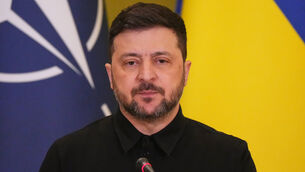Quiet Iraq stops to watch Saddam trial on TV
Violence-scarred Iraq enjoyed a rare day of relative peace today, as residents made special efforts to watch on television the opening of Saddam Hussein’s trial for genocide.
“I’m happy to see justice taking its course today,” said Haider Kadhim, 28, the owner of an electronics shop in Baghdad, a city that suffers from chronic power shortages.














